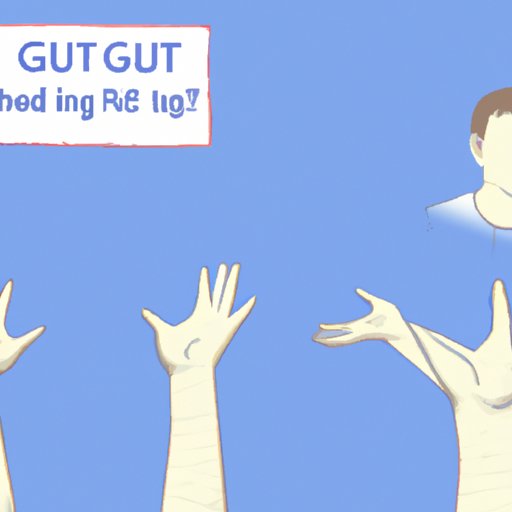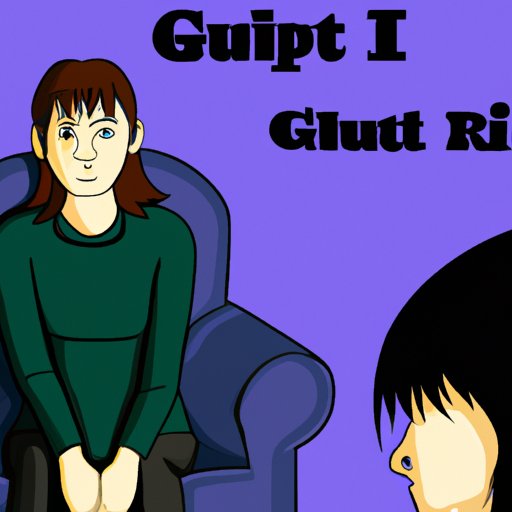Introduction
Have you ever felt like someone was trying to make you feel guilty for something? If so, then you may have been the victim of a “guilt trip”. The term “guilt trip” has become increasingly popular in recent years, but what does it really mean? This article will explore the definition and purpose of guilt trips, provide an explainer of how to recognize and avoid them, and examine the psychological effects of guilt trips on relationships.

An Explainer: What is a Guilt Trip and How to Avoid Taking One
A guilt trip is a tactic used by some people to manipulate or control another person. It involves making someone feel guilty for not doing something or for doing something wrong. Guilt trips can take many forms, such as emotional manipulation, verbal abuse, or passive-aggressive behavior. While guilt trips can be subtle, they can also be overt, with the intent to shame or blame the other person.
Guilt trips usually come from someone who has power over the person they are targeting. This could be a parent, partner, or boss. The goal of the guilt tripper is to make the other person feel guilty so that they will do what the guilt tripper wants. They may use threats, criticism, or even false accusations to get what they want.
There are several signs that you may be the target of a guilt trip. These include feeling like you are being judged, manipulated, or controlled; being made to feel like you are responsible for someone else’s feelings or actions; and feeling emotionally drained after interacting with someone. If you find yourself in this situation, there are several strategies you can use to avoid taking a guilt trip.
One strategy is to practice assertive communication. This means speaking up for yourself and expressing your needs and opinions without attacking or blaming the other person. You can also set boundaries for yourself and learn to say “no” when necessary. Finally, it is important to learn how to disengage from the guilt trip. This may involve removing yourself from the situation, taking a break, or simply not engaging in the conversation.
A Personal Story: My Experience of Being Guilt Tripped
I remember one particular incident when I was the target of a guilt trip. I had invited a friend to my birthday party, but she said she couldn’t come because she had other plans. I was disappointed, but I accepted her decision and moved on. Later, she started sending me messages accusing me of not caring about her, implying that I didn’t value our friendship. I felt like I was being blamed for something I had no control over and it made me feel guilty and ashamed.
The experience made me feel powerless and helpless. I could feel the other person’s anger and disappointment, and I was afraid to speak up for myself. I felt like I was walking on eggshells and that anything I said would only make things worse. In the end, I decided to ignore the messages and move on.
Looking back, I realize that this was a classic example of a guilt trip. My friend had tried to manipulate me into doing something I didn’t want to do by making me feel guilty. I now understand that it wasn’t my fault and that I had every right to stand up for myself.
A Guide to Recognizing Guilt Trips
In order to recognize and avoid guilt trips, it is important to understand the dynamics of guilt trips. Guilt trips often involve a power imbalance between the two people involved. The guilt tripper may use tactics such as guilt-inducing statements or behaviors to try to manipulate the other person into doing what they want.
It is also important to be aware of the signs of guilt-inducing behavior. This includes criticism, shaming, blaming, and belittling. Other signs include making demands, playing the victim, and using ultimatums. Examples of guilt trips include saying things like “If you loved me, you would…” or “You should be ashamed of yourself.”

The Psychology Behind Guilt Trips
Guilt is a natural emotion that we all experience at times. It is a part of normal human development and is closely linked to our conscience. From a biological perspective, guilt is an adaptive emotion that helps us make decisions and behave in socially appropriate ways. It can also help us to form strong social bonds with others.
However, guilt can also be used as a tool of control and manipulation. Power dynamics play a major role in guilt trips, as the guilt tripper has more power over the other person and is attempting to use it to make them do something they don’t want to do. This can lead to feelings of resentment and can have a negative impact on mental health.

How to Respond to Guilt Trips
When confronted with a guilt trip, it is important to remember that it is not your fault. It is the guilt tripper’s responsibility to control their own emotions, not yours. There are several strategies you can use to respond to guilt trips in a healthy and assertive way.
First, practice assertive communication. This means speaking up for yourself in a clear and direct way without attacking or blaming the other person. It also means setting boundaries and learning to say “no” when necessary. You can also try to disengage from the guilt trip by removing yourself from the situation or taking a break.

Strategies for Overcoming Guilt Trips
Once you have identified a guilt trip and taken steps to respond to it, it is important to focus on recovering from the experience. This may involve practicing self-compassion, challenging negative thoughts, and finding external support. Self-compassion involves treating yourself with kindness and understanding, rather than punishing yourself for the guilt trip. Challenging negative thoughts can help you to focus on the positive aspects of the situation. Finally, seeking outside help from a therapist or counselor can be beneficial if you are struggling to cope with the guilt trip.
Exploring the Impact of Guilt Trips on Relationships
Guilt trips can have a detrimental effect on relationships, as they can lead to feelings of resentment and distrust. To prevent this, it is important to be aware of the signs of a guilt trip and to take steps to address it in a healthy way. This may involve having honest conversations about expectations and boundaries, being mindful of power dynamics, and learning how to communicate in an assertive way. It is also important to practice self-care and seek outside help when needed.
Conclusion
In conclusion, guilt trips are a manipulative tactic used by some people to control or influence another person. They can have a negative impact on mental health and relationships. To avoid taking a guilt trip, it is important to recognize the signs of guilt-inducing behavior, practice assertive communication, and set boundaries. It is also important to practice self-care and seek help if needed. By understanding the dynamics of guilt trips and developing strategies to respond to them, you can protect yourself and build healthier relationships.
(Note: Is this article not meeting your expectations? Do you have knowledge or insights to share? Unlock new opportunities and expand your reach by joining our authors team. Click Registration to join us and share your expertise with our readers.)
